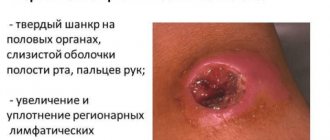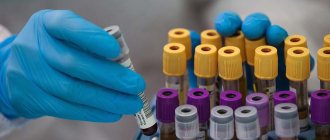Treponema pallidum, antibodies
This is the detection of total class M and G antibodies to the causative agent of syphilis, which can be used as an effective ultra-sensitive screening test for diagnosing early syphilis infection.
Synonyms Russian
Total antibodies to the causative agent of syphilis (Treponema pallidum), antibodies to Treponema pallidum IgG/IgM antigens.
English synonyms
Syphilis IgM, IgG; Treponema pallidum Antibodies, Total; Antibodies to T. pallidum, IgM/IgG, Anti-Treponema pallidum IgG/IgM.
Research method
Chemiluminescent immunoassay.
What biomaterial can be used for research??
Venous blood.
How to properly prepare for research?
Do not smoke for 30 minutes before donating blood.
General information about the study
The analysis is carried out to detect Treponema pallidum (treponema pallidum) - the bacterium that causes syphilis - a chronic sexually transmitted infectious disease that is most often transmitted sexually, for example, through direct contact with a syphilitic ulcer (chancroid), intrauterine infection is also possible. The source of infection is a sick person. Syphilis is easily curable, but can lead to serious health problems if left untreated. An infected mother can transmit the disease to her fetus, which may develop serious and irreversible changes.
There are several stages of syphilis. Primary occurs approximately 2-3 weeks after infection. One or sometimes several sores, called a chancre, usually appear on a part of the body that came into contact with a sick person's chancre, such as the penis or vagina. Chancroid is often painless and may go unnoticed, especially if it is in the rectum or cervix. The ulcer disappears after 4-6 weeks.
Secondary syphilis begins 2-8 weeks after the first appearance of chancre. This stage of the disease is characterized by the appearance of a roseolous-papular rash on the skin, most often on the palms and soles. There are other symptoms such as fever, fatigue, swollen lymph nodes, sore throat and body aches. If syphilis is not treated, it can develop in a latent form, in which the infected person does not show any symptoms but continues to be a carrier of the infection. This stage sometimes lasts for years.
15% of patients who are not treated develop late, or tertiary, syphilis, which can last for several years and eventually lead to mental illness, blindness, neurological problems (neurosyphilis), heart disease and even death.
There are several methods that can be used to test for syphilis. One of them makes it possible to detect antibodies to T. pallidum in the blood. This analysis is the most sensitive and specific for the detection of treponemal antibodies at all stages, including early ones.
When a person comes into contact with T. pallidum, their immune system reacts by producing antibodies to the bacterium. Two types of antibodies to Treponema pallidum can be detected in the blood: IgM and IgG.
In response to T. pallidum infection, IgM antibodies to T. pallidum are the first antibodies produced by the body. They are detected in most patients at the end of the second week of the disease and are present in them in the primary and secondary stages. Class G immunoglobulins to T. pallidum appear in detectable quantities in the blood 3-4 weeks after infection. Their concentration increases and in the 6th week begins to prevail over the concentration of IgM, reaching a maximum, and then remains at a certain level for a long time.
Starting from the 4th week, the amount of both types of immunoglobulins in the blood increases, which leads to a positive test result for total antibodies to T. Pallidum. This allows this test to be used for early diagnosis of T. pallidum infection.
After effective treatment, the concentration of immunoglobulins gradually decreases, but this happens slowly; in some cases, antibodies can be detected after a year or more.
Syphilis can be treated with antibiotics, and it is preferable to use penicillin derivatives. At an early stage, the disease is treated easier and faster. Longer therapy may be needed for patients infected for more than a year.
What is the research used for?
- For the diagnosis of syphilis.
- For examination of all pregnant women for preventive purposes (preferably at the first appointment with a gynecologist, when registering).
When is the study scheduled?
- For symptoms of syphilis, such as chancroid on the genitals or throat.
- When a patient is being treated for another STD, such as gonorrhea.
- When managing pregnancy, because syphilis can be transmitted to the developing fetus and even kill it.
- When it is necessary to determine the exact cause of the disease if the patient has nonspecific symptoms that are similar to syphilis (neurosyphilis).
- If the patient is infected, they should repeat the syphilis test after 3, 6, 12 and 24 months to ensure that treatment has been successful.
What do the results mean?
Reference values
Result: negative.
S/CO ratio (signall/cutoff): 0 - 0.9.
A positive result means that the patient has a recently acquired infection. However, a negative result does not always mean that the patient does not have syphilis.
Positive result
A positive result in a previously seronegative patient, as well as a significant increase in titers in paired sera taken at an interval of 7 days, indicates a primary infection. Detection of antibodies to treponema in the blood of a newborn helps confirm the diagnosis of congenital syphilis.
In addition, the cause of a positive result may be tertiary or latent syphilis.
Negative result
A negative test result may indicate the absence of infection or its early stage when an immune response has not developed. At the same time, the absence of antibodies in a baby born from an infected mother does not exclude a congenital disease, since antibodies may not yet have formed at the time of the study.
What can influence the result?
False-positive results may occur with diseases such as HIV, Lyme disease, malaria, systemic lupus erythematosus, some types of pneumonia, as well as drug addiction and pregnancy.
Important Notes
- The examination for syphilis must be comprehensive and include taking into account the medical history, clinical picture and confirmation of the diagnosis by laboratory data.
- People who are sexually active should consult a doctor about any suspicious rashes or pain in the genital area.
- If a patient is diagnosed with infection, he/she needs to inform his/her sexual partner so that he/she can also undergo examination and, if necessary, treatment.
- With syphilis, the risk of contracting other sexually transmitted diseases increases, including the risk of contracting HIV, which leads to AIDS.
- Syphilis can also be transmitted through blood transfusion through contaminated medical instruments, so it is very important to be tested before hospitalization.
Also recommended
- Treponema pallidum, IgG, titer
- Treponema pallidum, IgM, titer
- Syphilis RPR (anticardiolipin test/precipitation microreaction), titer
- Treponema pallidum, IgG in cerebrospinal fluid
- Treponema pallidum, DNA [PCR]
- Syphilis RPHA (passive hemagglutination reaction), titer
Who orders the study?
Dermatologist, dermatovenerologist, gynecologist, urologist, infectious disease specialist, therapist, pediatrician.
This is the detection of total class M and G antibodies to the causative agent of syphilis, which can be used as an effective ultra-sensitive screening test for diagnosing early syphilis infection.
Synonyms Russian
Total antibodies to the causative agent of syphilis (Treponema pallidum), antibodies to Treponema pallidum IgG/IgM antigens.
English synonyms
Syphilis IgM, IgG; Treponema pallidum Antibodies, Total; Antibodies to T. pallidum, IgM/IgG, Anti-Treponema pallidum IgG/IgM.
Research method
Chemiluminescent immunoassay.
What biomaterial can be used for research??
Venous blood.
How to properly prepare for research?
Do not smoke for 30 minutes before donating blood.
General information about the study
The analysis is carried out to detect Treponema pallidum (treponema pallidum) - the bacterium that causes syphilis - a chronic sexually transmitted infectious disease that is most often transmitted sexually, for example, through direct contact with a syphilitic ulcer (chancroid), intrauterine infection is also possible. The source of infection is a sick person. Syphilis is easily curable, but can lead to serious health problems if left untreated. An infected mother can pass the disease to her fetus, which may develop serious and irreversible changes.
There are several stages of syphilis. Primary occurs approximately 2-3 weeks after infection. One or sometimes several sores, called a chancre, usually appear on a part of the body that came into contact with a sick person's chancre, such as the penis or vagina. Chancroid is often painless and may go unnoticed, especially if it is in the rectum or cervix. The ulcer disappears after 4-6 weeks.
Secondary syphilis begins 2-8 weeks after the first appearance of chancre. This stage of the disease is characterized by the appearance of a roseolous-papular rash on the skin, most often on the palms and soles. There are other symptoms such as fever, fatigue, swollen lymph nodes, sore throat and body aches. If syphilis is not treated, it can develop in a latent form, in which the infected person does not show any symptoms but continues to be a carrier of the infection. This stage sometimes lasts for years.
15% of patients who are not treated develop late, or tertiary, syphilis, which can last for several years and eventually lead to mental illness, blindness, neurological problems (neurosyphilis), heart disease and even death.
There are several methods that can be used to test for syphilis. One of them makes it possible to detect antibodies to T. pallidum in the blood. This analysis is the most sensitive and specific for the detection of treponemal antibodies at all stages, including early ones.
When a person comes into contact with T. pallidum, their immune system reacts by producing antibodies to the bacterium. Two types of antibodies to Treponema pallidum can be detected in the blood: IgM and IgG.
In response to T. pallidum infection, IgM antibodies to T. pallidum are the first antibodies produced by the body. They are detected in most patients at the end of the second week of the disease and are present in them in the primary and secondary stages. Class G immunoglobulins to T. pallidum appear in detectable quantities in the blood 3-4 weeks after infection. Their concentration increases and in the 6th week begins to prevail over the concentration of IgM, reaching a maximum, and then remains at a certain level for a long time.
Starting from the 4th week, the amount of both types of immunoglobulins in the blood increases, which leads to a positive test result for total antibodies to T. Pallidum. This allows this test to be used for early diagnosis of T. pallidum infection.
After effective treatment, the concentration of immunoglobulins gradually decreases, but this happens slowly; in some cases, antibodies can be detected after a year or more.
Syphilis can be treated with antibiotics, preferably penicillin derivatives. At an early stage, the disease is treated easier and faster. Longer therapy may be needed for patients infected for more than a year.
What is the research used for?
- For the diagnosis of syphilis.
- For examination of all pregnant women for preventive purposes (preferably at the first appointment with a gynecologist, when registering).
When is the study scheduled?
- For symptoms of syphilis, such as chancroid on the genitals or throat.
- When a patient is being treated for another STD, such as gonorrhea.
- When managing pregnancy, because syphilis can be transmitted to the developing fetus and even kill it.
- When it is necessary to determine the exact cause of the disease if the patient has nonspecific symptoms that are similar to syphilis (neurosyphilis).
- If the patient is infected, they should repeat the syphilis test after 3, 6, 12 and 24 months to ensure that treatment has been successful.
What do the results mean?
Reference values
Result: negative.
S/CO ratio (signall/cutoff): 0 - 0.9.
A positive result means that the patient has a recently acquired infection. However, a negative result does not always mean that the patient does not have syphilis.
Positive result
A positive result in a previously seronegative patient, as well as a significant increase in titers in paired sera taken at an interval of 7 days, indicates a primary infection. Detection of antibodies to treponema in the blood of a newborn helps confirm the diagnosis of congenital syphilis.
In addition, the cause of a positive result may be tertiary or latent syphilis.
Negative result
A negative test result may indicate the absence of infection or its early stage when an immune response has not developed. At the same time, the absence of antibodies in a baby born from an infected mother does not exclude a congenital disease, since antibodies may not yet have formed at the time of the study.
What can influence the result?
False-positive results may occur with diseases such as HIV, Lyme disease, malaria, systemic lupus erythematosus, some types of pneumonia, as well as drug addiction and pregnancy.
Important Notes
- The examination for syphilis must be comprehensive and include taking into account the medical history, clinical picture and confirmation of the diagnosis by laboratory data.
- People who are sexually active should consult a doctor about any suspicious rashes or pain in the genital area.
- If a patient is diagnosed with infection, he/she needs to inform his/her sexual partner so that he/she can also undergo examination and, if necessary, treatment.
- With syphilis, the risk of contracting other sexually transmitted diseases increases, including the risk of contracting HIV, which leads to AIDS.
- Syphilis can also be transmitted through blood transfusion through contaminated medical instruments, so it is very important to be tested before hospitalization.
Also recommended
- Treponema pallidum, IgG, titer
- Treponema pallidum, IgM, titer
- Syphilis RPR (anticardiolipin test/precipitation microreaction), titer
- Treponema pallidum, IgG in cerebrospinal fluid
- Treponema pallidum, DNA [PCR]
- Syphilis RPHA (passive hemagglutination reaction), titer
Who orders the study?
Dermatologist, dermatovenerologist, gynecologist, urologist, infectious disease specialist, therapist, pediatrician.






